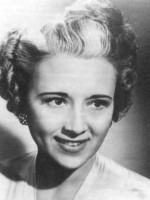Sam Levene is a Actor American born on 28 august 1905

Sam Levene (August 28, 1905 – December 28, 1980) was an American Broadway and film actor. He made his Broadway debut in 1927 with five lines in a play titled Wall Street, and over a span of nearly 50 years, appeared on Broadway in 37 Shows, of which 33 were the original Broadway Productions, many now considered legendary. Levene made his film debut in 1936 as Patsy recreating the same role he had created on Broadway in Three Men on a Horse (1935). Levene also appeared in the USO Tour of this same Show; the Radio Version; the Musical version that opened on Broadway called Let It Ride (1961) as well as the 1969 Broadway Revival of the play directed by George Abbott, the original Broadway Director and co-author.
Levene also starred in the Broadway productions Dinner at Eight (1932), Room Service (1937), Light Up the Sky (1948), Heartbreak House (1959), The Impossible Years (1965), and Neil Simon's The Sunshine Boys (1972), among many others. Although not known as a singer, he can be heard in the role of Nathan Detroit on the original cast recording of the musical Guys and Dolls, in which he appeared on Broadway. His solo number, "Sue Me," was written in one octave to compensate for his lack of vocal range. He lost the role to Frank Sinatra in the film version. Levene was nominated for the 1961 Tony Award for Best Actor in a Play for The Devil's Advocate (1961).
In the mid-'30s, Levene moved to Hollywood to re-create his stage role in the film Three Men on a Horse (1936). This was followed by roles as police lieutenants in After the Thin Man (1936), The Mad Miss Manton (1938) and Shadow of the Thin Man (1941). He played a small but vital role in the 1939 film classic Golden Boy as William Holden's taxi-driving brother-in-law "Siggie", a Doolittle Flyer and Japanese POW in the The Purple Heart (1944), and many film noir classics, such as The Killers (1946), Brute Force (1947) and Crossfire (1947). Levene made 49 films total during his Hollywood career, including The Opposite Sex (1956), Sweet Smell of Success (1957), Slaughter on Tenth Avenue (1957), Act One (1963), A Dream of Kings (1969), Such Good Friends (1971), God Told Me To (1976) and Last Embrace (1979). His last film role was in the courtroom drama ...And Justice for All (1979).
In December of 1980, he died of a heart attack in New York City.
Au cinéma, Sam Levene contribue à quarante-deux films américains, de 1936 à 1979, l'un de ses plus connus étant le film noir Les Tueurs en 1946, aux côtés d'Ava Gardner et Burt Lancaster — avec lequel il avait joué à Broadway l'année précédente (1945), dans la pièce A Sound of Hunting, et qu'il retrouvera l'année suivante (1947), dans le film Les Démons de la liberté —.
À la télévision, il participe à treize séries et à trois téléfilms, entre 1954 et 1977.
Source : Wikidata
Sam Levene

- Infos
- Photos
- Best films
- Family
- Characters
- Awards
Birth name Scholem Lewin
Nationality USA
Birth 28 august 1905
Death 28 december 1980 (at 75 years) at New York City (USA)
Nationality USA
Birth 28 august 1905
Death 28 december 1980 (at 75 years) at New York City (USA)
Levene also starred in the Broadway productions Dinner at Eight (1932), Room Service (1937), Light Up the Sky (1948), Heartbreak House (1959), The Impossible Years (1965), and Neil Simon's The Sunshine Boys (1972), among many others. Although not known as a singer, he can be heard in the role of Nathan Detroit on the original cast recording of the musical Guys and Dolls, in which he appeared on Broadway. His solo number, "Sue Me," was written in one octave to compensate for his lack of vocal range. He lost the role to Frank Sinatra in the film version. Levene was nominated for the 1961 Tony Award for Best Actor in a Play for The Devil's Advocate (1961).
In the mid-'30s, Levene moved to Hollywood to re-create his stage role in the film Three Men on a Horse (1936). This was followed by roles as police lieutenants in After the Thin Man (1936), The Mad Miss Manton (1938) and Shadow of the Thin Man (1941). He played a small but vital role in the 1939 film classic Golden Boy as William Holden's taxi-driving brother-in-law "Siggie", a Doolittle Flyer and Japanese POW in the The Purple Heart (1944), and many film noir classics, such as The Killers (1946), Brute Force (1947) and Crossfire (1947). Levene made 49 films total during his Hollywood career, including The Opposite Sex (1956), Sweet Smell of Success (1957), Slaughter on Tenth Avenue (1957), Act One (1963), A Dream of Kings (1969), Such Good Friends (1971), God Told Me To (1976) and Last Embrace (1979). His last film role was in the courtroom drama ...And Justice for All (1979).
In December of 1980, he died of a heart attack in New York City.
Biography
En 1907, deux ans après sa naissance en Russie, sa famille émigre aux États-Unis et s'installe à New York. Sam Levene débute au théâtre à Broadway en 1927, jouant sur les planches new-yorkaises jusqu'en 1980, quelques mois avant sa mort. Parmi les nombreuses pièces auxquelles il participe (il sera même metteur en scène de l'une d'elles en 1956, expérience non-renouvelée), mentionnons Three Men on a Horse en 1935, où il interprète le rôle de Patsy, qu'il reprendra dans l'adaptation au cinéma de 1936 (son premier film), puis lors d'une reprise à Broadway en 1969-1970. Chanteur occasionnel, il collabore également à trois comédies musicales, dont Blanches colombes et vilains messieurs, de 1950 (création) à 1953 ; il y personnifie Nathan Detroit, rôle repris par Frank Sinatra dans l'adaptation au cinéma de 1955. Et en 1961, il joue encore Patsy dans Let It Ride, comédie musicale adaptée de la pièce Three Men on a Horse, déjà évoquée. Notons également que cette même année 1961, pour son rôle dans la pièce The Devil's Advocate, il reçoit une nomination au Tony Awards du meilleur acteur (15e cérémonie ).Au cinéma, Sam Levene contribue à quarante-deux films américains, de 1936 à 1979, l'un de ses plus connus étant le film noir Les Tueurs en 1946, aux côtés d'Ava Gardner et Burt Lancaster — avec lequel il avait joué à Broadway l'année précédente (1945), dans la pièce A Sound of Hunting, et qu'il retrouvera l'année suivante (1947), dans le film Les Démons de la liberté —.
À la télévision, il participe à treize séries et à trois téléfilms, entre 1954 et 1977.
Best films
Usually with
Filmography of Sam Levene (43 films)
Actor

...And Justice for All (1979)
, 1h59Directed by Norman Jewison
Origin USA
Genres Drama, Thriller, Comedy-drama, Crime
Themes Films about sexuality, LGBT-related films, Transgender in film, LGBT-related films, LGBT-related film
Actors Al Pacino, Jack Warden, John Forsythe, Lee Strasberg, Jeffrey Tambor, Christine Lahti
Roles Arnie
Rating73%





Arthur Kirkland (Al Pacino), a defense attorney in Baltimore, is in jail on a charge of contempt of court for having thrown a punch at judge Henry T. Fleming (John Forsythe) while arguing the case of Jeff McCullaugh (Thomas G. Waites), who was stopped for a minor traffic offense but then mistaken for a killer of the same name and has already spent a year and a half in jail, as Kirkland continues his efforts to have the case reviewed against Fleming's resistance. Though there is strong new evidence that Jeff is innocent, Fleming refuses McCullaugh's appeal due to a minor technicality and leaves him in prison.

The Champ (1979)
, 2h3Directed by Franco Zeffirelli
Origin USA
Genres Drama
Themes Films about families, Sports films, Martial arts films, Boxing films, Le boxe anglaise
Actors Jon Voight, Faye Dunaway, Rick Schroder, Jack Warden, Arthur Hill, Joan Blondell
Roles Oncle Eddie
Rating68%





Billy Flynn, an ex-boxing champion, is now a horse trainer in Hialeah, Florida. He makes just enough money to raise his little son T.J., of whom Flynn has full custody of since his wife Annie left him, seven years before the events of the film. T.J. worships "The Champ," who has gambling debts and begins working on a comeback to give his boy a better future. Suddenly Annie shows up again and wants to become a part of T.J.'s life.

Last Embrace (1979)
, 1h42Directed by Jonathan Demme
Origin USA
Genres Drama, Thriller, Crime, Romance
Actors Roy Scheider, Janet Margolin, Sam Levene, Christopher Walken, John Glover, Jacqueline Brookes
Roles Sam Urdell
Rating59%





The film opens in a Mexican cantina across the border from El Paso, where government agent Harry Hannan is canoodling with his wife. Harry spots an informant that he was supposed to meet in a few days. Realizing he is about to be attacked, he shoves his wife to the ground and starts shooting at the informant's companions who return fire and flee the restaurant. Harry's wife dies in the attack, and he suffers a nervous breakdown. He spends 161 days in a Connecticut sanitarium before being released.
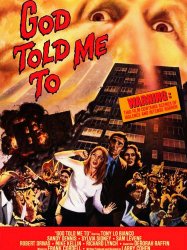
God Told Me To (1976)
, 1h30Directed by Larry Cohen
Origin USA
Genres Science fiction, Thriller, Horror, Crime
Themes Films about religion
Actors Tony Lo Bianco, Deborah Raffin, Sandy Dennis, Sylvia Sidney, Sam Levene, Robert Drivas
Roles Everett Lukas
Rating62%





In New York City, a sniper perched on a water tower opens fire on the crowded streets below, killing fifteen pedestrians. Peter Nicholas (Tony Lo Bianco), a Catholic NYPD detective, arrives at the scene and approaches the sniper as police officers surround the building. Before jumping to his death, the sniper, Harold Gorman, tells Nicholas that God had told him to commit the murders. A traumatized Nicholas is left to wonder how Gorman could have aimed accurately at his distance with a mail order rifle.

Such Good Friends (1971)
, 1h41Directed by Otto Preminger
Origin USA
Genres Drama, Comedy, Comedy-drama
Themes Feminist films, Political films
Actors Dyan Cannon, James Coco, Jennifer O'Neill, Ken Howard, Nina Foch, Laurence Luckinbill
Roles Uncle Eddie
Rating59%





Manhattanite Julie Messinger, a complacent housewife and mother of two raucous young sons, is married to Richard, a chauvinistic and self-centered magazine art director and author of a best-selling children's book. When he falls into a coma during minor surgery to remove a nonmalignant mole on his neck, Julie learns from his doctor, Dr. Timmy Spector, that another surgeon nicked his artery, necessitating a blood transfusion to which he had a rare allergic reaction. The following day, Julie is told Richard has overcome the reaction, but his liver has sustained serious damage requiring immediate treatment. In quick succession, all his organs begin to fail.

A Dream of Kings (1970)
, 1h10Directed by Daniel Mann
Origin USA
Genres Drama
Actors Anthony Quinn, Irène Papas, Inger Stevens, Sam Levene, Val Avery, Radames Pera
Roles Cicero
Rating62%





Matsoukas, a Chicago-based Greek/American with his long suffering wife Caliope, learns that his son is dying. Convinced that the child will do better in Greece, he attempts to raise the airfare to get the family back there.

Act One (1963)
, 1h50Directed by Dore Schary
Origin USA
Genres Drama
Themes Films based on plays
Actors George Hamilton, Jason Robards, Jack Klugman, Sam Levene, Ruth Ford, Eli Wallach
Roles Richard Maxwell
Rating59%





In 1929 young Brooklynite Moss Hart, influenced by the great playwrights, devotes his leisure time to writing for the theater. Failing in his aspirations, however, he accepts a job as social director in the Catskills and then stages plays at the YMHA in Newark. Eventually he takes the advice of agent Richard Maxwell and writes a comedy, Once in a Lifetime, which deals with the early days of Hollywood films, despite the fact that his knowledge of the movie industry is derived from the pages of Variety. After being subsidized by a friend, Joe Hyman, he sends the manuscript to producer Warren Stone, who promises a decision within a week. When months pass without any word, Hart's friends sneak a copy of the play to Sam Harris, who agrees to produce it if George Kaufman will collaborate on the script and also direct. Although Kaufman consents, the Atlantic City opening is a failure, and he considers quitting until Hart comes up with an idea that both men feel will turn the play into a hit. It finally opens to rave reviews in New York City in September 1930, thus beginning the long-lasting Kaufman-Hart collaboration.

A Farewell to Arms (1957)
, 2h32Directed by John Huston, Charles Vidor, Andrew Marton
Origin USA
Genres Drama, War, Romance
Themes Political films, Children's films
Actors Rock Hudson, Jennifer Jones, Vittorio De Sica, Elaine Stritch, Oskar Homolka, Mercedes McCambridge
Roles Un sergent suisse
Rating58%





Frederick Henry (Rock Hudson) is an American officer serving in an ambulance unit for the Italian Army during World War I. While recovering from a wound in a British base hospital in northern Italy, he is cared for by Catherine Barkley (Jennifer Jones), a Red Cross nurse he had met earlier, near the front, and they engage in an affair. Frederick's friend, the doctor, convinces the army that Frederick's knee is more severely wounded than it actually is and the two continue their romance but never get married.

Sweet Smell of Success (1957)
, 1h36Directed by Alexander Mackendrick
Origin USA
Genres Drama, Thriller, Noir, Crime, Romance
Themes Films about writers, Films about journalists
Actors Burt Lancaster, Tony Curtis, Martin Milner, Susan Harrison, Sam Levene, Barbara Nichols
Roles Frank D' Angelo
Rating79%





Manhattan press agent Sidney Falco (Tony Curtis) has been unable to gain mentions for his in J.J. Hunsecker's (Burt Lancaster) influential, nationally syndicated newspaper column of late because of Falco's failure to make good on a promise to break up the romance between Hunsecker's younger sister Susan (Susan Harrison) and musician Steve Dallas (Martin Milner), an up-and-coming jazz guitarist.
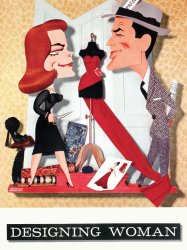
Designing Woman (1957)
, 1h58Directed by Vincente Minnelli
Origin USA
Genres Comedy, Romantic comedy, Romance
Actors Dolores Gray, Lauren Bacall, Gregory Peck, Sam Levene, Tom Helmore, Mickey Shaughnessy
Roles Ned Hammerstein
Rating66%





While on vacation, sports reporter Mike Hagen (Gregory Peck) meets fashion designer Marilla Brown (Lauren Bacall). The two instantly bond and quickly get married, only to realize they have little in common.
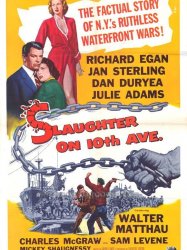
Slaughter on 10th Avenue (1957)
, 1h43Directed by Arnold Laven
Origin USA
Genres Drama, Crime
Actors Richard Egan, Jan Sterling, Dan Duryea, Julie Adams, Walter Matthau, Charles McGraw
Roles Howard Rysdale
Rating65%





William Keating, procureur à la cour, est désigné pour enquêter sur la tentative de meurtre du docker Solly Pitts. Très vite, il soupçonne le truand Eddie Cook, auteur de nombreuses violences. Mais la victime ainsi que tous les témoins de la scène refusent de témoigner contre celui-ci...
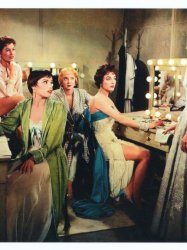
The Opposite Sex (1956)
, 1h57Directed by David Miller
Origin USA
Genres Drama, Comedy, Romantic comedy, Musical, Romance
Themes Films about music and musicians, Musical films, Films based on plays
Actors June Allyson, Joan Collins, Dolores Gray, Jeff Richards, Ann Sheridan, Ann Miller
Roles Mike Pearl
Rating60%





The story concerns Kay Hilliard (June Allyson), a former nightclub singer who discovers her husband Steven (Leslie Nielsen) is having an affair with showgirl Crystal Allen (Joan Collins). Kay is the last to find out among her circle of gossiping girlfriends. Kay travels to Reno to divorce from Steve who then marries Crystal, but when Kay finds out that Crystal isn't true to Steve she starts fighting to win her ex-husband back.
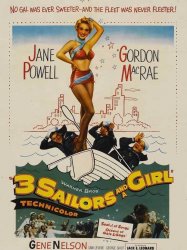
Three Sailors and a Girl (1953)
, 1h35Directed by Roy Del Ruth
Origin USA
Genres Comedy, Musical
Themes Théâtre, Musical films, Films based on plays
Actors Jane Powell, Gordon MacRae, Gene Nelson, Burt Lancaster, Sam Levene, George Givot
Roles Joe Woods
Rating60%





While their submarine is docked in New York City, three sailors on liberty invest the money they've earned at sea into a broadway musical and its up and coming star.
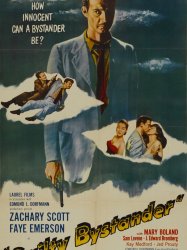
Guilty Bystander (1950)
, 1h31Origin USA
Genres Drama, Noir, Crime
Actors Zachary Scott, Faye Emerson, Mary Boland, Sam Levene, J. Edward Bromberg, Kay Medford
Roles Captain Tonetti
Rating61%





Max Thursday is an alcoholic ex-cop. The only job he can find is as a house detective at his pal Smitty's hotel.

With These Hands (1950)
, 52minutesDirected by Jack Arnold
Origin USA
Genres Drama, Documentary
Themes Films about the labor movement, Documentary films about historical events, Documentaire sur le monde du travail, Political films, Disaster films
Actors Sam Levene, Arlene Francis, Joseph Wiseman, Alexander Scourby, Jack Arnold, Rudy Bond
Roles Alexander Brody
Rating54%





Le documentaire s'intéresse à l'évolution des conditions de travail des ouvrières qui confectionnaient des vêtements (International Ladies' Garment Workers' Union), de 1910 où les conditions étaient déplorables, jusqu'aux années 1950, où les conditions et les salaires étaient bien meilleurs grâce à la création et l'intervention des syndicats.
 Connection
Connection



